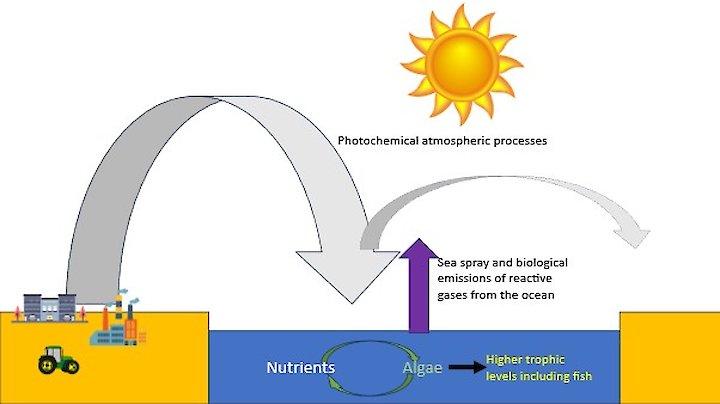Lead agency: World Meteorological Organization (WMO).
Supporting agencies: International Maritime Organisation (IMO), United States National Science Foundation (NSF), Scientific Committee on Oceanic Research (SCOR), Surface Ocean-Lower Atmosphere Study (SOLAS), and the Universities of East Anglia and Crete.
Overview
The overall aim of Working Group 38 is to investigate the impacts that various chemicals in the Earth’s atmosphere have on the Earth’s oceans, a process known as atmospheric deposition. WG 38 is a group of scientific experts who collaborate to evaluate current scientific evidence of environmental trends relating to atmospheric deposition, including the associated uncertainties.
Since their formation, WG 38 has investigated topics such as atmospheric nitrogen and iron deposition, ocean acidification effects on atmospheric chemistry, microplastic transport through the atmosphere and exchange with the ocean, and changes in algal growth in response to atmospheric nutrients. Their work aims to provide government, commerce, industry and society with a reliable foundation on which to base decisions.
Background
Atmospheric deposition is the process by which various substances (gases, particles, aerosols, precipitation) transfer from the Earth’s atmosphere to its surface, including the oceans. Some of the most important of these substances are from predominantly natural sources for example desert dust particles and the elements like iron contained within these particles, and others predominantly now arise from human activity, for example nitrogen compounds from combustion processes and agricultural activity. The deposition of these substances can have significant impacts on ocean biogeochemistry (the ways that biological, physical, geological, and chemical processes all interact with each other in the natural environment), and climate. Emissions of gases and particles from the ocean can in turn modify the atmospheric transport and deposition of material over the oceans, creating a complex series of interlinked Earth system processes There is growing concern about the influence that human activity is having on these processes.
Schematic representation of the atmosphere ocean exchange processes of interest within WG38
It is important to know more about the impacts that atmospheric deposition is having on the oceans currently, as well as the potential future consequences of these issues so that appropriate actions can be recommended. This is what WG 38 was set up to do.
History and work of WG 38
WG 38 was formed in 2008. Since its formation, it has held in-person meetings or workshops at the University of Arizona, Tuscon, AZ in 2008, at IMO in London in 2010, in Malta in 2011, and at the University of East Anglia, Norwich, UK in 2013 and 2017. It has held a virtual workshop in 2020 and a combined virtual/in-person workshop in 2022 in Gqeberha, South Africa. A workshop will be held at the University of Crete in Greece in April, 2025.
WG 38’s early work considered several aspects of atmospheric deposition over the ocean. Their earliest report is GESAMP Reports and Studies 84, “The Atmospheric Input of Chemicals to the Ocean”. Additionally, four scientific papers were published in the peer-reviewed scientific literature based on this report – these papers are listed at the end of this webpage (numbers 1-4).
Over time, the group’s work has identified significant and complex scientific issues that require more in-depth study. These issues have included:
· 2013-2017: The impacts of atmospheric nitrogen deposition on the oceans
· 2017-2019: The impacts of ocean acidification on atmospheric chemistry and atmospheric nutrient solubility
· 2020-2022: The transport of microplastics in the atmosphere
· 2019-current: The role of atmospheric deposition in large-scale algal growth in the Madagascar Channel and the southwest Indian Ocean
The results of each of the above workshops have been reported in both GESAMP’s Reports and Studies documents, as well as published as peer-reviewed scientific literature. A full list of all 20+ peer-reviewed publications can be found at the bottom of this webpage.
In their most recent work, WG 38 developed a new type of workshop; one that not only focused on the scientific aspects of atmospheric deposition to the oceans, but also brought together ocean managers and policymakers to facilitate interdisciplinary collaboration and capacity building. This workshop was initiated by GESAMP at its meeting in New York in 2019 but was delayed for several years due to Covid-19. The workshop eventually took place on October 4-7, 2022, at Nelson Mandela University in Gqeberha (Port Elizabeth), South Africa.
Current and future work of WG 38
The results of the 2022 workshop are now being synthesized for publication, both as part of the GESAMP Reports and Studies series, as well as in the peer-reviewed scientific literature.
WG 38 will organise a new workshop in April 2025 at the University of Crete on “Research priorities for improving global chemical flux estimates of atmospheric deposition to the ocean” bringing together a diverse group of experts to consider ways to imp[rove estimates of air-sea exchange of key biogeochemical comonents.
For the past 7 years, WG 38 has organized a session on the exchange of chemicals between the atmosphere and the ocean as part of the European Geosciences Union meeting held each year in Vienna, Austria. We expect this effort to continue in subsequent years.
Current members of WG 38
Co-chairs: Robert Duce, (USA) and Timothy Jickells, (United Kingdom)
Sajjad Abbasi, Iran (early career), Deonie Allen, New Zealand, Katye Altieri, South Africa, Alex Baker, United Kingdom, Cecile Guieu, France, Frances Hopkins, United Kingdom, Akinori Ito, Japan, Maria Kanakidou, Greece, Daoji Li, China, Peter Liss, United Kingdom, Natalie Mahowald, USA, Morgane Perron, Australia/France (early career), Mike Roberts, South Africa, Monmohan Sarin, India.
Please find a full list of peer-reviewed publications of GESAMP Working Group 38 here.
Page last updated: 16 May 2025
